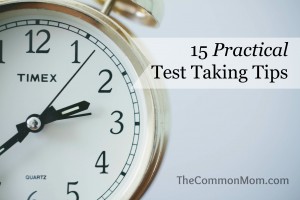This is the second year my daughter has taken part in the Duke Talent Identification Program (TIP). She took the Explore test this morning. The testing site was about an hour-and-a-half away. It was an early morning.
The benefits of above-level testing definitely outweigh the pain of getting up early on a Saturday. We’ve used her scores (even the lower-than-should-be English score from last year when she didn’t answer all the questions) in advocacy. She’s participated in book clubs, taken online classes and perhaps most importantly, she’s gained invaluable experience in how to take these tests.
In other words, she’s learning how to take a high-stakes test while the stakes are low.
One of the questions I’ve gotten from parents is how to prepare kids for testing.
The Short Answer
You don’t.
Just like trying to prep a child for an IQ test, efforts usually backfire. Kids end up getting so stressed that they do worse than if they took it cold. It’s not worth it.
The Long Answer
I consider these tips on how to take a test, any test, not necessarily how to pass a test.
- Instill in your child a success or growth mindset. They need to believe that if they work hard they will achieve their goals. Believing they’ll succeed just because they’re smart isn’t going to work because eventually they won’t know the answer. This is where gifted kids can crumble. You’ve probably seen this happen. It’s not pretty. Developing a growth mindset isn’t really test prep as much as life prep.
- There’s usually a practice test with the confirmation packet and your child should take it in the week or so prior to the actual test. Not because of the content but so they get familiar with the format of the questions. Test day is not when they should first see the kind of multiple choice or essay questions they’re responsible for. Fewer surprises mean better test takers.
- Send them to bed on time the night before. Maybe even a little early. Everyone does better and is happier when they’re well rested.
- Wake them a little earlier than you think you need to. Today isn’t the day for rushing around and being frantic. Lay out clothes the night before so you’ll know the lucky t-shirt isn’t in the wash. As you can imagine, that is NOT a good situation.
- Have the correct documentation ready. Is there a test voucher or letter you need to present? Undoubtedly. Put it with the car keys so you don’t forget it. This is one of my own biggest fears.
- Breakfast is the most important meal of the day! At least on this day it is. The brain doesn’t function well on an empty stomach. No donuts.
- If there’s a break scheduled (and there probably is), pack a snack. My daughter took a half a turkey sandwich. That’s her comfort food and it kept her going through the second half of testing.
- Are calculators allowed? Maybe, probably. If so, there are strict rules for the type allowed. Read the rules and follow them.
- Have pencils sharpened and ready to go. If the test asks for #pencils, send #2 pencils. Pack a sharpener. And erasers that actually erase and not just create smears.
- Have them wear a watch. This is a big one. The tests are timed and there may not be a clock in the room. Unlikely but it’s possible. But maybe the clock doesn’t work. Or your student can’t see it from where she’s sitting. And the proctor forgets to give the five-minute warning. Empower your child to be able to manager her time herself.
- Educate your child on common test taking practices like answering questions they know they know first and then going back to ones they’re not sure of. Explain how to eliminate answers to come up with the best option. Test taking strategies are one of the best things they’ll get out of this process.
- If the test requires them to show their work, they have to show their work. This is a frustrating thing for some gifted students who just ‘know’ the answer. Sometimes you just have to follow the rules. Another important lesson they need to learn.
- When all else fails, guess. It’s better than no answer at all.
- Finish early? They should go back and take another look at their answers. Not necessarily to make second guesses but check to make sure they didn’t make silly mistakes. Like forgetting to answer a question. I know, that NEVER happens. Can you tell this has been our own personal issue?
- It should go without saying, but I’ll say it anyway, don’t put too much pressure on your child. Regardless of how they do on a test, any test, it’s still just a test. They’re still the same person regardless if they ace it or bomb it. They need your unconditional support not additional pressure. Most of them put enough pressure on themselves.
How’d she do? We won’t know for a few weeks. She answered all the questions and she feels confident. She’s good with that and so am I.
What test taking strategies can you share?










